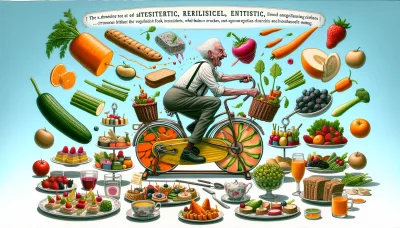Best vitamins for seniors Quiz
Test Your Knowledge
Question of
Essential Vitamins for Seniors: Understanding Nutritional Needs
Vitamin D: The Sunshine Vitamin
Vitamin D is crucial for seniors, playing a pivotal role in bone health and calcium absorption. As we age, our skin's ability to synthesize Vitamin D from sunlight diminishes, making supplementation and dietary intake increasingly important.
Sources of Vitamin D include sunlight exposure, fatty fish like salmon and mackerel, fortified foods, and supplements. It's essential to balance natural sources with supplements to meet the recommended daily intake without overdoing it.
The recommended daily intake of Vitamin D for seniors is higher than for younger adults. The aim should be for at least 800 to 1000 IU per day, though some studies suggest even higher amounts might be beneficial for optimal bone health.
Vitamin B12: Key for Nerve Function
Vitamin B12 deficiency can lead to significant health issues in seniors, including anemia and impaired nerve function. Symptoms of deficiency include fatigue, weakness, memory loss, and mood changes.
The best sources of Vitamin B12 are animal-based products such as meat, fish, poultry, eggs, and dairy. Fortified cereals and plant-based milk alternatives can also contribute to the daily intake for those following vegetarian or vegan diets.
Seniors often face challenges in absorbing Vitamin B12 due to decreased stomach acid production. This makes it crucial for older adults to seek fortified foods or supplements to ensure adequate levels are maintained.
Antioxidant Vitamins: Combating Oxidative Stress
Antioxidant vitamins A, C, and E play a vital role in combating oxidative stress and supporting overall health in seniors. These vitamins help protect cells from damage and support a healthy immune system.
Natural food sources rich in these antioxidants include colorful fruits and vegetables, nuts, seeds, and whole grains. Regularly including a variety of these foods in your diet can help maintain optimal antioxidant levels.
-
Tips for Balancing Antioxidants Through Diet:
- Eat a rainbow of fruits and vegetables daily to maximize the variety of antioxidants consumed.
- Incorporate nuts and seeds into meals or as snacks for their vitamin E content.
- Choose whole grain products over refined ones to increase antioxidant intake.
- Consider supplementing when dietary intake might not meet the recommended levels, especially for vitamins A and E.
Tailoring Diets to Age-Related Changes
Metabolic Rate and Caloric Needs
As we age, our metabolic rate slows down, necessitating adjustments in caloric intake to match this change. This means fewer calories are needed to maintain the same weight. It's crucial to understand this shift to prevent unwanted weight gain.
The impact on weight management is significant. With a slower metabolism, older adults face challenges in maintaining a healthy weight. Adjusting daily caloric intake based on activity level and metabolic changes is essential for weight control.
Balancing macronutrients becomes increasingly important with age. Ensuring a diet rich in proteins, moderate in fats, and careful with carbohydrates can help manage weight and support overall health. Prioritizing nutrient-dense foods over empty calories is key.
Digestive System Considerations
Incorporating high-fiber foods into the diet can significantly benefit digestive health, especially for seniors. Fiber aids digestion, prevents constipation, and can lower the risk of digestive disorders. Fruits, vegetables, and whole grains are excellent sources.
Hydration plays a critical role in senior health, impacting everything from digestion to cognitive function. Older adults often experience reduced thirst sensation, making it vital to consciously increase fluid intake to prevent dehydration.
- Probiotics: These beneficial bacteria support gut health, aiding in digestion and nutrient absorption. Fermented foods like yogurt and kefir are great sources.
- Fiber: Aiming for 25-30 grams of fiber daily from fruits, vegetables, and whole grains can improve bowel movements and digestive health.
- Hydration: Drinking at least 8 glasses of water a day helps maintain digestive function and overall health.
- Regular Meals: Eating smaller, more frequent meals can ease the digestive process for older adults.
Sensory Changes Affecting Diet
Taste alterations can affect appetite and nutritional intake in older adults. Adapting meals to enhance flavor without excessive salt or sugar is crucial. Using herbs, spices, and citrus can make dishes more appealing while maintaining nutritional value.
Texture modifications may be necessary for easier eating, especially for those with dental issues or dysphagia. Opting for softer foods or altering cooking methods can make meals more accessible without compromising on nutrition.
Crafting appealing and nutritious meals is essential for maintaining health in older age despite sensory changes. Creativity in meal presentation and ingredient selection can significantly improve meal enjoyment and ensure a balanced diet.
Addressing Common Health Concerns with Diet
Heart Health and Cholesterol Control
Diving into the heart of the matter, managing your heart health and cholesterol levels through diet is not just a possibility; it's a proven strategy. Embracing foods rich in Omega-3 fatty acids, cutting down on sodium, and loading up on soluble fiber are key steps in this life-saving dance. This isn't just advice; it's a blueprint for a healthier heart!
Omega-3 Fatty Acids and Their Sources : Omega-3s are like your heart's best friends. Found abundantly in fish like salmon, mackerel, and sardines, as well as in flaxseeds and walnuts, these fats are champions at battling inflammation and keeping cholesterol levels in check. Make them a staple in your diet and watch your heart thank you!
Low-Sodium Diet Benefits : If salt is the enemy, consider yourself the hero on a quest for low-sodium glory. Reducing salt intake can significantly lower blood pressure, thereby reducing the risk of heart disease. Fresh fruits, vegetables, and unsalted nuts are your allies in this quest.
Incorporating Soluble Fiber : Soluble fiber is like a sponge for cholesterol, soaking it up before it can clog your arteries. Oats, beans, lentils, apples, and pears are packed with this miraculous nutrient. Make them a part of every meal to wield their power.
Bone Density and Osteoporosis Prevention
Bones might be hidden under skin and muscles, but they should never be out of mind, especially when it comes to preventing osteoporosis. A diet rich in calcium, magnesium, potassium, and vitamin D is your first line of defense against weakening bones. Let's build a fortress for your skeletal system!
Calcium-Rich Foods and Absorption : Calcium is the cornerstone of strong bones. Dairy products are famous for their calcium content but don't overlook leafy greens, almonds, and fortified foods. Pairing these with vitamin D-rich foods or safe sun exposure enhances calcium absorptiondouble win!
- Milk, cheese, yogurt: High in calcium.
- Leafy greens: Think kale and spinach; they're not just for salads.
- Almonds: Snack on them; your bones will thank you.
- Fish with bones: Sardines and canned salmon offer both calcium and omega-3s.
- Fortified foods: Orange juice and cereals can also be good sources of calcium.
Role of Magnesium and Potassium : Magnesium helps convert vitamin D into its active form to improve calcium absorption while potassium neutralizes acids that leach calcium from bones. Avocados, nuts, bananas, and potatoes are great sources. Consider them guardians of your bone health.
Cognitive Function and Brain Health
Your brain is the command center of your body; keeping it in prime condition is non-negotiable! Nutrition plays a pivotal role herefoods rich in Omega-3s, antioxidants, hydration practices, and certain herbal supplements can significantly bolster cognitive function and memory retention.
Foods Rich in Omega-3s and Antioxidants : Omega-3 fatty acids do wonders for your brain just as they do for your heart. Combine them with antioxidant-rich berries, dark chocolate (yes!), nuts, and green tea to protect brain cells from damage while boosting memory power.
Importance of Hydration for Cognitive Performance : Water isn't just vital for survival; it's crucial for cognitive performance too. Dehydration can lead to difficulty concentrating, memory lapses, and even mood swings. Aim for 8 glasses a day to keep your brain hydrated and happy.
Herbal Supplements and Memory : Certain herbal supplements like Ginkgo Biloba have shown promise in improving memory function. However, approach with cautionconsult with a healthcare provider before diving into the world of supplements to ensure they're right for you.
Special Dietary Considerations for Seniors
As we age, our bodies undergo various changes that necessitate adjustments in our dietary habits. For seniors, maintaining a balanced diet is crucial for managing chronic conditions, preventing nutrient deficiencies, and ensuring overall well-being. Tailoring nutrition to the unique needs of seniors can significantly enhance their quality of life.
It's imperative to understand that the dietary needs of seniors vary significantly from those of younger adults. Factors such as decreased metabolism, changes in taste and appetite, and the need to manage health conditions like diabetes or hypertension play a critical role in shaping these unique dietary considerations.
Managing Diabetes with a Senior-Friendly Diet
Diabetes management is paramount for many seniors, requiring a careful balance of nutrients to maintain blood sugar levels. A senior-friendly diet focusing on low-glycemic index foods can mitigate blood sugar spikes and support overall health.
Monitoring carbohydrate intake is another cornerstone of diabetes management. Seniors should aim for a consistent carb intake at each meal to prevent sudden increases or decreases in blood sugar levels. Incorporating fiber-rich foods can also help slow the absorption of sugar into the bloodstream.
The importance of regular meal timing cannot be overstated for seniors managing diabetes. Eating at consistent times helps stabilize blood sugar levels throughout the day, reducing the risk of hypoglycemia or hyperglycemia.
Dietary Approaches to Hypertension
Hypertension, or high blood pressure, is a common concern for seniors. Adopting dietary approaches such as the DASH (Dietary Approaches to Stop Hypertension) Diet principles can have a profound impact on managing this condition.
- The DASH Diet Principles: Emphasizes fruits, vegetables, whole grains, and lean proteins while minimizing saturated fats, cholesterol, and sugary foods.
- Potassium-Enriched Foods: Consuming potassium-rich foods helps counteract the effects of sodium and can aid in lowering blood pressure levels.
- Limiting Alcohol and Caffeine Consumption: Both alcohol and caffeine can elevate blood pressure; hence, it's advisable for seniors to limit their intake of these substances.
Preventing Nutrient Deficiencies in Seniors
Nutrient deficiencies pose significant risks to senior health, contributing to anemia, weakened bones, and compromised immunity. Ensuring a diet rich in essential vitamins and minerals is therefore critical.
Incorporating iron-rich foods into the diet is vital for preventing anemiaa common condition among seniors that results in fatigue and weakness. Sources include lean meats, beans, and fortified cereals.
Maintaining adequate vitamin D levels is crucial for bone health, especially since seniors are at increased risk for osteoporosis. Sunshine exposure combined with dietary sources like fatty fish and fortified milk can boost vitamin D intake.
B vitamins are essential for energy production and metabolism. Seniors should ensure their diet includes plenty of B-vitamin-rich foods such as whole grains, eggs, and dairy products to support cellular energy production and prevent fatigue.
Planning Meals for Optimal Senior Nutrition
Structuring a Balanced Plate
When it comes to senior nutrition, getting the balance right is crucial. A balanced plate should feature a healthy mix of proteins, carbohydrates, and fats. This ensures not only a variety of nutrients but also helps in maintaining energy levels throughout the day. Proteins are essential for muscle repair, carbs provide energy, and fats are vital for brain health.
A rainbow on your plate does more than make your meal Instagram-worthy; it ensures you're getting a wide range of vitamins and minerals. Fruits and vegetables of different colors offer unique benefits, from antioxidants to heart health support. Make it a goal to incorporate as many hues as possible in every meal.
Whole grains are a fantastic source of fiber and nutrients. Incorporating whole grains into meals can improve digestion, support heart health, and help maintain stable blood sugar levels. Options like quinoa, brown rice, and whole wheat bread are not only nutritious but also add variety to the diet.
Snacking Strategies for Sustained Energy
Snacks aren't just treats; they're opportunities to fuel the body between meals. Choosing the right snacks can prevent energy dips and support overall health. Healthy snacks should combine proteins, healthy fats, and fibers for sustained energy release.
Blood sugar regulation is crucial for preventing diabetes and maintaining energy levels. Snacks play a significant role in this by providing the body with a steady supply of nutrients. Options like mixed nuts or apple slices with peanut butter are great for keeping blood sugar levels stable.
- Healthy Snack Ideas:
- Greek yogurt with berries
- Sliced vegetables with hummus
- Whole grain toast with avocado
- Almonds or walnuts
- Snacks to Support Cognitive Function:
- Blueberries or other dark-colored berries
- Pumpkin seeds or sunflower seeds
- Dark chocolate (in moderation)
Hydration: A Key Component of Senior Diets
Hydration is often overlooked but is critical for seniors. Dehydration can lead to confusion, urinary tract infections, and even hospitalization. Recognizing signs of dehydration early onsuch as dry mouth, fatigue, or dizzinessis key to preventing these issues.
The general recommendation is for seniors to drink eight 8-ounce glasses of water per day. However, individual needs can vary based on activity level, climate, and health conditions. It's important to adjust fluid intake accordingly and consult healthcare providers when necessary.
Incorporating water-rich foods into the diet can also help boost hydration levels. Foods like cucumbers, tomatoes, oranges, and melons are not only hydrating but also provide essential vitamins and minerals. These foods can be an excellent way to increase water intake without having to drink more fluids outright.
Overcoming Dietary Restrictions and Allergies
Gluten-Free Options for Seniors with Celiac Disease or Sensitivity
Naturally Gluten-Free Foods
Fruits, vegetables, meat, poultry, fish, dairy, and legumes are naturally gluten-free and safe for seniors with celiac disease or sensitivity. Incorporating these foods into daily meals ensures a balanced diet while avoiding gluten.
It's crucial to emphasize fresh and unprocessed foods in a gluten-free diet. These naturally gluten-free options minimize the risk of exposure to hidden sources of gluten often found in processed foods.
Reading Labels for Hidden Gluten
Reading labels is a skill that must be mastered to identify hidden sources of gluten in packaged foods. Ingredients like malt, barley, and rye are red flags for people with gluten intolerance.
Understanding food labeling laws helps seniors make informed choices. Products labeled as "gluten-free" must meet strict standards, ensuring they're safe for consumption by individuals with celiac disease or sensitivity.
Gluten-Free Whole Grains
Whole grains like quinoa, rice, buckwheat, and millet are excellent gluten-free alternatives that offer essential nutrients and fiber. These grains can be included in meals to maintain a balanced diet.
Incorporating a variety of gluten-free whole grains ensures seniors receive a wide range of nutrients while adhering to their dietary restrictions. Experimenting with different grains adds diversity to meals and prevents dietary boredom.
Lactose Intolerance: Finding Alternatives
Lactose-Free Dairy Products
Lactose-free dairy products are specifically processed to remove lactose, making them suitable for individuals with lactose intolerance. These products allow seniors to enjoy dairy without gastrointestinal discomfort.
Yogurt with live active cultures and hard cheeses often contain lower levels of lactose and may be easier to digest for people with lactose intolerance. Experimentation can help identify which products are well-tolerated.
Calcium Sources Without Dairy
- Bone Health: Calcium is crucial for bone health; non-dairy sources include leafy greens, almonds, and fortified plant-based milks.
- Vitamin D Synergy: Vitamin D enhances calcium absorption; consider supplements or vitamin D-rich foods like fatty fish or egg yolks.
- Daily Requirements: Adults over 50 need 1,200 mg of calcium daily; ensure intake through a combination of foods and supplements if necessary.
Digestive Enzymes and Lactose Intolerance
Digestive enzymes like lactase can help break down lactose in dairy products, enabling some individuals with lactose intolerance to enjoy dairy in moderation without experiencing symptoms.
Taking lactase supplements before consuming dairy can significantly reduce or eliminate symptoms of lactose intolerance. It's important to consult with a healthcare provider before starting any supplement regimen.
Nut-Free Diets for Allergy Management
Safe Protein Alternatives
For those with nut allergies, alternative protein sources include seeds (like sunflower or pumpkin seeds), legumes (such as lentils and chickpeas), and animal-based proteins (meat, poultry, fish).
Including a variety of protein sources ensures nutritional needs are met while avoiding nuts. Creative cooking methods can make these alternatives appealing and satisfying.
Cross-Contamination Awareness
Avoiding cross-contamination is critical in managing nut allergies. This involves using separate cooking utensils and appliances for nut-free foods to prevent accidental exposure.
Educating family members about the risks of cross-contamination helps create a safer eating environment at home. Vigilance in restaurants is also necessary by communicating allergy concerns clearly to staff.
Label Reading Skills for Nut Allergies
Reading food labels meticulously is essential for identifying potential nut ingredients in packaged foods. Terms indicating the presence of nuts include names of specific nuts (e.g., almonds, walnuts) or general terms like "tree nuts."
Familiarity with labeling laws aids in understanding how allergens are indicated on packaging. In many regions, laws require clear labeling of common allergens like nuts to protect consumers.
The Role of Supplements in Senior Diets
When Supplements Are Necessary
As we age, our bodies undergo various changes that can impact our nutritional needs. For seniors, maintaining a balanced diet becomes crucial, yet sometimes, food alone isn't enough to meet those needs. That's where supplements step in, filling the gaps and ensuring seniors get the essential nutrients they require for a healthy life.
Identifying Gaps in Nutrition is the first step towards understanding when supplements are necessary. Not all seniors have the same dietary requirements; some might lack specific vitamins or minerals due to dietary restrictions or health conditions. It's essential to pinpoint these deficiencies to address them effectively.
Consulting Healthcare Providers is imperative before adding any supplements to your diet. They can offer invaluable advice on what your body needs and recommend high-quality supplements that won't interfere with any existing medications or health conditions.
The Quality and Efficacy of Supplements cannot be overstated. With a market flooded with countless options, choosing the right supplement is paramount. Look for products with verified quality standards to ensure you're getting the best support for your health.
Common Supplement Options for Seniors
Understanding which supplements can benefit senior health is vital. A well-chosen supplement regimen can significantly enhance well-being and prevent nutrient deficiencies.
Multivitamins Tailored to Seniors are designed with the aging population in mind, focusing on nutrients that are often lacking in senior diets like B vitamins, vitamin D, and calcium. These multivitamins act as a nutritional safety net, supporting overall health.
Omega-3 Supplements for Heart and Brain Health are critical for seniors. Omega-3 fatty acids support heart health by maintaining healthy blood pressure levels and have been shown to protect against cognitive decline, making them a top choice for aging individuals.
- Calcium and Vitamin D for Bone Strength: Essential for preventing osteoporosis and maintaining bone health. As the body's ability to synthesize vitamin D decreases with age, supplementation becomes increasingly important.
- Tips for Choosing Supplements:
- Select age-appropriate formulas that cater specifically to senior nutritional needs.
- Opt for brands that have undergone third-party testing for purity and potency.
- Prioritize supplements that address your specific dietary gaps or health concerns.
- Always consult with a healthcare provider before starting any new supplement regimen.
Potential Interactions with Medications
The complexity of managing both medications and supplements cannot be underestimated in senior care. Awareness and caution are key to ensuring that supplements do not negatively interact with prescribed medications.
Keeping Track of Medication and Supplement Regimens is crucial for avoiding adverse interactions. Utilize tools like medication diaries or apps to monitor what you're taking and when, ensuring nothing is overlooked.
Discussing Supplements with Pharmacists or Doctors should never be skipped. These professionals can provide insights into potential interactions and advise on safe supplement use alongside medications.
A regular review of your supplement necessity is essential. Needs change over time; what was necessary at one point may no longer be required later on. Regular check-ins with healthcare providers ensure your regimen remains optimal for your health status.












